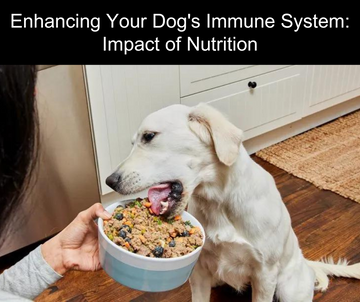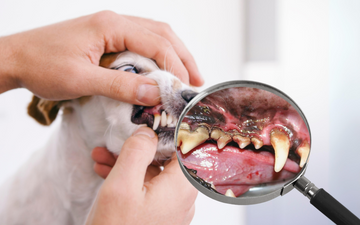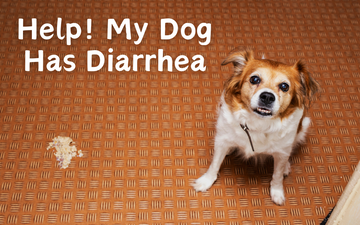
Do you know how your dog’s immunity system works?
A dog's immune system is like a defense team inside their body. The team's job is to protect the dog from harmful invaders, like germs and viruses.
If your dog frequently becomes sick, it's natural to question their immunity, but how can you boost your dog's immune system to help them stay healthier?
Your goal is to keep your pet happy and healthy so you make sure they get the best of everything, be it, taking them on regular walks, timely deworming, and vaccines for dog.
But is the dog food you feed your pooch helping your cause?
Nutrition plays a significant role in supporting a dog's immune system.
Does a well-balanced diet mean a good immune system?
A well-balanced diet refers to a dietary pattern that provides the body with all the essential nutrients it needs in the right proportions to maintain good health and support proper functioning. Reading this definition you might come to the conclusion that you are providing your dog a well-balanced diet but are you sure? Studies have revealed that 95% of homemade dog food recipes lacked at least one essential nutrient. Lack of nutrients is going to have a negative impact on your dog’s immune system.
Proteins make up almost everything in the body from enzymes essential for digestion to hormones regulating the body's physiology but how does protein help immunity?
Heard about antibodies; they are like specialized soldiers within the immune system. Their primary role is to identify and neutralize specific threats, such as invading pathogens like bacteria, viruses, and other foreign substances; these antibodies are composed of large protein molecules. You might have taken care of your dog's protein needs by providing them easily digestible protein like chicken, fish, eggs, etc.
The next crucial aspect to consider in a dog's diet is fats. They are broken down to essential fatty acids which can not be synthesized by the dog's body but have to be provided strictly through diet. Arachidonic acid, which is a polyunsaturated omega-6 fatty acid, is found only in animal tissues; they are conditionally essential and have important roles in the immune system. Omega-3 fatty acids, found in fish oil, have anti-inflammatory effects and may help in managing certain autoimmune conditions in dogs.
You would be lying if you say that the status of your stomach does not affect your mood. Why would it be any different for your dog and we know a happy dog is a healthy dog, Dietary fibers, particularly soluble fibers, can promote a healthy gut microbiome in dogs. Fiber serves as food for beneficial gut bacteria, which helps maintain a balanced and diverse population of microbes in the digestive tract. This, in turn, supports the immune system because a significant portion of the immune system is located in the gut-associated lymphoid tissue (GALT).
Beneficial bacteria such as Bifidobacterium and lactobacilli are supported by fermentable fibers aid in the digestion and absorption of food, provide a source of vitamins to the host animal, and stimulate gastrointestinal immune function.
Why are we advised to eat green vegetables and fruits? Because they are rich in antioxidants which protects cells from damage caused by free radicals, they are unstable molecules that are created naturally by the body during normal metabolism. Fruits and vegetables like blueberries, spinach, and carrots are rich in antioxidants and can be included in a dog's diet.
The importance of vitamins and minerals in dog food has been well established by now but are they important for immunity as well?
Yes, Vitamin C can boost the immune system, especially in times of stress or illness.
Vitamin A is essential for maintaining the health of the skin and mucous membranes, which are the body's first line of defense against invaders.
Vitamin D helps regulate the immune system and can enhance the antimicrobial responses of monocytes and macrophages.
Vitamin E and Selenium have antioxidant properties and they also protect cells from free radical damage.
Vitamin B complex helps in production of antibodies, remember they are like specialized soldiers within the immune system.
Can you mention some foods that are rich in zinc? Most of the pet parents forget to add zinc to the diet of their pooches but they are oblivious to the fact that zinc play an important role in protein synthesis this means that even if your fulfilling the need of protein in your dog’s diet lack of zinc is going to result in retarded growth and development of your dog affecting immunity of the dog in the process.
It's important to note that while proper nutrition can support immune function, it's just one piece of the puzzle. A healthy lifestyle, including regular exercise, adequate sleep, stress management, and good hygiene practices, also plays a significant role in maintaining a strong immune system.






